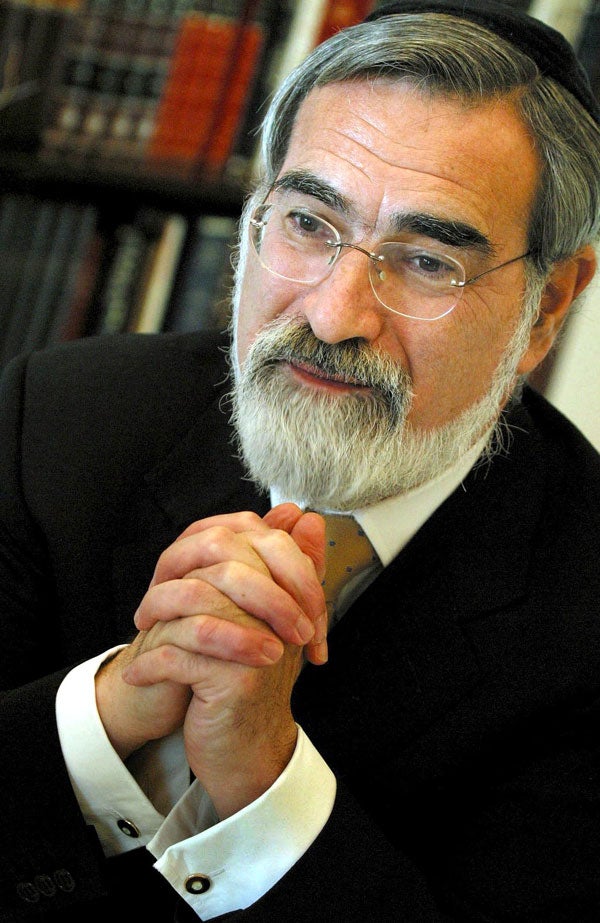The Great Partnership: God, Science and the Search for Meaning, By Jonathan Sacks

We need all of our brain to understand and appreciate the world around us. The left-brain, associated largely with scientific activity, and the right hemisphere concerned with religious matters, must work in unison. But they also have to be kept apart. The logic of one does not apply to the other. The challenge of our time is to keep the two separate but integrated and in balance. This, in essence, is the main message of The Great Partnership.
The learned and humane Jonathan Sacks normally speaks from within the Jewish tradition. But here he is much more inclusive, drawing from Judaism, Christianity and, he claims, Islam. He emphasises that the foundations of all three faiths rests on a personal God who created the universe in love and endowed all of us with the dignity of His image. His erudition is extensive. We are leisurely taken on a tour of sacred and poetic texts of Judaism and Christianity, as well as the thoughts of noted atheists and old-fashioned and postmodern philosophers.
Sacks is not interested in proving the existence of God. He engages in a conversation, "a sustained argument for the sake of heaven", to demonstrate that it is quite possible for a rational person to hold religious beliefs. Writing in the tradition of 18th-century religious philosophers, such as William Paley, Sacks hopes to promote tolerance and civility. The real urgent conflict, he suggests, is not between different kinds of belief and non-belief, but between militant dogmas, and their champions, of all varieties.
The contemporary militant atheist, the likes of Richard Dawkins and Sam Harris, are confronted directly; and their primary-school arguments are rendered into mincemeat. Sacks sees Harris, for whom "the very idea of religious tolerance... is one of the principal forces driving us towards the abyss", as a real threat to civilisation and civic virtues.
However, Sacks's argument about the complementary nature of the scientific and religious approaches, the one searching for explanation, the other searching for meaning is not particularly original. In the Islamic tradition, for example, it was debated for over six centuries. We find the best exploration in On the harmony of Religion and Philosophy by the great 12th-century Moorish philosopher, Ibn Rushd. Despite his claim to include Islamic tradition in his analysis, Sacks is rather unfamiliar with the rich heritage of Islamic discourse on reason and revelation.
There is also a problem with his central argument. Meaning of a system, he suggests, must lie outside it. Thus the meaning of our empirical world is located outside it, in something we call God. Science needs religion, or at least some philosophical understanding of the human condition, to provide meaning for it discoveries. This is a classical argument from the apologist tradition; and it has a structural weakness. It is easier to argue for the need for something beyond, more difficult to argue for a deity in general, and then quite demanding to argue for one deity rather than the other. It would have been more original to argue why God is needed in the first place.
But despite an unavoidable weakness in his argument, Sacks is engaging and thought-provoking throughout. His exploration of the deep difference between classical Greek and Hebrew thought - the being rooted in universals, and the latter in particulars – is quite brilliant. Philosophers, concerned with the Truth and the Good opted for universal principles, while the Talmud discussions simply report the (frequently contradictory) sayings of eminent rabbis on a problem.
The synthesis of the two approaches, first realised in the Greek-language accounts of the life of a rabbi called Jesus, lasted until the scientific revolution. By then, the Reformation had displayed the fatal divisions in religious teaching, and so philosophers turned to science for security. The resulting secularisation, evolving over centuries, is seen by Sacks and his sources (religious and irreligious alike) as the root of many of our current discontents.
Sacks demonstrates his courage and integrity most fully in his discussion of the problem of evil. This is not merely the pain and injustice in the world, but also the evil wrought by religion, through its institutions and, even worse, sincere believers. The corruption of religion by politics and materialistic concerns, he argues, is a recipe for disaster. When religious texts are taken literally and applied directly, religion is perverted and becomes at odds with its deepest moral convictions. Evil ensues.
Sacks's daytime job, as we all know, is that of Chief Rabbi, representing the Orthodox United Synagogue but not the other sections of British Jewry. He has found that achieving interfaith accord is a breeze compared to achieving intrafaith harmony. Despite all the difficulties he has faced, he continues to live by his religion, which shines through this wonderful book. Without doubt he is a wise thinker and a national treasure. But many of Sacks's remarks about the frailties of religion, including the warning about the entrapments of power and the need for humility, will not sit easily with his colleagues – here in Britain and in Israel. That, in my opinion, only enhances his stature.
Ziauddin Sardar is professor of law and society at Middlesex University. His most recent book is 'Reading the Qur'an' (Hurst)
Join our commenting forum
Join thought-provoking conversations, follow other Independent readers and see their replies
Comments